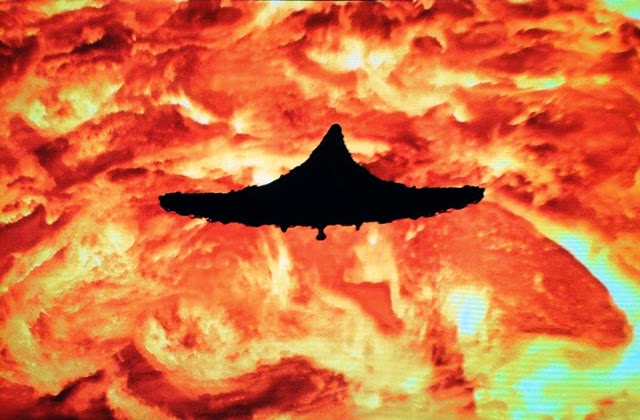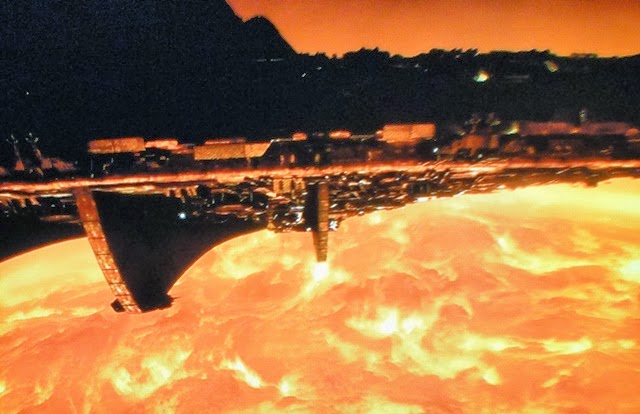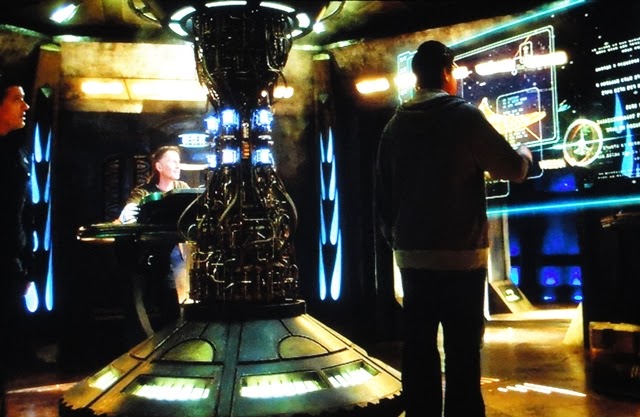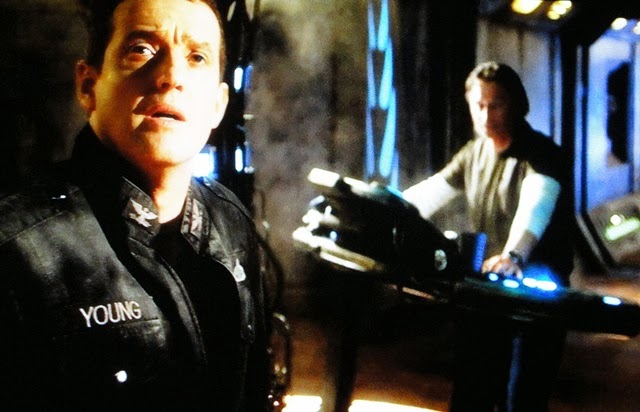"The ship... coming here, was my destiny."
-Dr. Nicholas Rush-
"The ship is powered by the stars themselves."
-Dr. Nicholas Rush weaving the romanticism of space into Stargate Universe like poetry-



Danger lurks at every turn for the survivors aboard Destiny. With its debut, three-part Air, oxygen systems were key to their survival and rectifying damaged CO2 scrubbers was key to that effort. With Darkness, power failures became the latest casualty of the Destiny. With Stargate Universe, Season One, Episode 5, Light, a new challenge awaits the decision makers aboard the Ancients ancient vessel. Life and death counts on people making the right contributions and decisions and a little good fortune.
If you're looking for the subtle ways in which Stargate Universe differentiates itself from Stargate Atlantis and Stargate SG-1, one could look at the general approach these series take to their portraits of humanity.






SG-1 and SGA could be described as bringing out the best of humanity or at least weighting character decisions toward a more positive opinion of human behavior in general terms. SGU certainly takes an alternative, more tense approach unbroken by consistent comic levity. Perhaps this approach is another reason it is often lumped in or compared to the Ronald D. Moore version of Battlestar Galactica. In many respects, these two series view human behavior through a more intense, life and death prism. Reactions to stressful circumstances and questions of trust are abound. Rather than rising to the occasion we often find the human condition put to the test with varied results. It would be unfair to say Stargate Universe casts a negative light on humanity. It more accurately casts both negative and positive reactions shedding light on character whilst character motivation is left sometimes ambiguous and yet to be revealed. It's often very subtle. Moore's Battlestar Galactica was indeed the reigning king of this dark, distrustful world tapping into the zeitgeist of post-911 distrust in the West and likening the Cylons to Muslim extremists. When the Cylons look like you who do you trust?


SGU takes a similar tact. It is the pervasive mood of survival and a sense of isolation that extends to the survivors aboard the Destiny. These factors tend to affect our minds in ways that are ultimately hard to predict. There's no need for Cylons here because it's our nature within that will dictate who we are. In other words, it's not always as rosy or ultimately as positive as SG-1 would paint it, but it's not always as bad as one might be led to believe either. Humanity often worked in coordinated fashion on the previous two Stargate incarnations. Here on SGU, people, not trained to affiliate and coordinate and of different backgrounds, are asked to step up and cooperate. But it's not quite the "bleak, humorless affair" Blu-Ray.com dubbed it in comparison to Battlestar Galactica fight against the Cylons. But the factor of trust and distrust remains.


Blu-Ray.com believed there was a sense that "betrayal lurks around every corner," whereas SGA was conceived as a series founded in mutual respect. Writer Kenneth Brown saw SGU as "an ugly, at-times maddening chess game populated with too many self-interested pawns trying to work their way up the board."
One needs to look no further than SGU Light in search of the small victories of humanity's castaways. In my brief experience viewing the series there is a greater depth of reality and sincerity of character drawn by the creators for the latest iteration than the previous incarnations. SGU has also been anything but "maddening" in my view. Sometimes there are moments of real beauty and human reflection.


Beyond the fact actor Brian J. Smith is the fortunate recipient of bedding or banging two extremely hot chicks in the span of five episodes, actually three when you consider Air as a three-parter, SGU is actually setting a course for quality in science fiction. Yes, young master Matthew Scott had sex with Vanessa James, played by Julia Benson, against the concrete wall in Air, but Light sees the series leap forward a bit in time. Evidence of event movement is gleaned through characters who have moved closer to one another in their emotional connections. Scott is now in a sexual relationship Chloe Armstong, played by Elyse Levesque. Eli Wallace, played by David Blue, is discovering this new relationship first hand and it is a cutting and unfortunate realization to his hopes. Without question these women are extremely attractive and Benson may have the biggest breasts I've ever seen in a major science fiction production for some time.
But let's get back on track here. The sensual scenes between Scott and Armstrong in Light are expertly lit and flooded with soft yellows and oranges in the form of star or sun light.




How appropriate director Peter Deluise should follow Darkness with Light. It's clear this is a class effort to lens the new series in stunning fashion. Where DeLuise handled Darkness in affectingly minimalist fashion, Light sees the director working with lush oranges and yellows and opening things up. In fact, color is utilized throughout the series in glorious fashion. Green, blue and now orange hues truly draw out the series visually and thematically evoking the concern of universe affecting them around the Destiny. It is both beautiful and dangerous. Light is doused with just the right touch of light throughout. And the sexual encounter between Armstrong and Scott is handled rather tastefully against Goldsmith's gorgeous score. And, again, I cannot overstate the beauty of his soundtrack to the series. It is clearly a unique character all its own. How I must own it.
Additionally, the juxtaposition of Darkness and Light really establishes visually the thematic conflicts aboard the Destiny, good and evil and everything in between. It visually sets the tone in play for SGU.
The positively epic and cinematic SGU.


And speaking of the dangers of the cosmos, the entry focuses on a lottery that crew members will partake. With the Destiny on a collision course with a star, it drops out of FTL nearing a barely habitable planet. With the fate of the Destiny likely to be doomed as it enters a white hot star, the stop gives seventeen passengers a chance to exit the ship and have a shot at continued existence, while the remainder remain aboard the Destiny doomed to their fates.
There's a grim air to the tale filled with an overriding sense of hopelessness as there appear to be no options left. But, it's not bleak based on the heavily flawed motivations of humanity. Despite all of that star shine though, the irony is there isn't a whole lot of sunshine to go around about the Ancients vessel. In fact, one passenger aboard the shuttle filled with the lottery-selected crew realizes it's his birthday. Someone wishes him a Happy Birthday as if wishing comfort into the moment while little happiness seems to permeate the warm, quiet glow of the shuttle.


The lottery selection sequence is truly unsettling. Everett Young, played by Louis Ferreira, must select fifteen passengers plus two of his choosing for the shuttle. The unnerving, emotional power of the moment is profoundly captured on film, once again, by director Peter DeLuise. Some will live and some are destined to die. The stress and anxiety of the scene is pronounced with the drawing of each passing name. For some hope and light, for others a death sentence.



When Camile Wray, played by Ming-Na (Agents Of Shield, Final Fantasy: The Spirits Within), is chosen, she physically cries when she reaches the shuttle. Her reaction coupled with Goldsmith's soundtrack is nothing short of emotionally stirring stuff. It was moving to experience as the departure of the selected is bittersweet for all. There is indeed a profound sense of finality in the air for those left behind basking in the orange glow of the star light. The sequences are both emotionally and visually spectacular.
One of the things about Light that I found particularly enlightening was that it really did shed some additional light on character. The folks aboard the Destiny feel real and human and Light merely continues to emphasize that aspect of the series and for that it is a wonderful journey. Ronald Greer, played by Jamil Walker Smith, seeking personal redemption for past wrongs is a fine example. But all of these characters offer up a sense of release about themselves as a result of the fate that awaits them. They, in effect, let down their guard, as if accepting a sense of finality. It's extraordinary television if you allow yourself to live in their world.

In fact, the survivors recite the Lord's prayer in preparation for their untimely death. This is the second time in three short episodes where there is a Christian and spiritual component to a people that clearly have faith. It's such a rarity in television you can't help but sit up and take notice. It's refreshing to see faith still alive here on SGU or as pronounced as it was in Falling Skies, S1, Ep4, Grace.




Tears fall. Passengers reflect on their lives. All take moments to ponder existence.
And the story ends in a surprising turn. Instead of the standard conflict/resolution often associated with Stargate Atlantis or SG-1, the denizens aboard the Destiny simply realize they are the fortunate recipients of one of those inexplicable chances of the cosmos, or in this case, the Ancients. The Destiny has entered the scalding hot interior of the star to replenish its energy reserves. All power that was lost in Darkness is being restored. The ship was shutting down simply as the result of a vessel conserving its power and preserving its energy to protect itself from the star's pure energy and radiation. Power was being re-routed by design like the crew of the Enterprise-D would re-route power to shields in a fire fight. The shields protected them. The star has given them light and life. The Destiny lives another day through a little luck and Ancient innovation.

So rather than a random, heavily technical explanation that is so complex and so technical it merely flies over our heads and we shrug, SGU purports a relatively explicable reason for their survival and we are left merely to experience the human impact and the emotion of its survivors. The Destiny is a solar-powered vessel. It thrives off of the stars. It is the stars that give it life. We may not fully understand how, but we believe.
And thus, meanwhile, the shuttle group, heading off to begin a new life, is equally concerned about their fate. There is no joy for them with the realization that a great struggle and hardship lies ahead for them. As Tamara Johansen, played by Alaina Huffman, states, "I can't help but think that maybe they are the lucky ones," referring to the fate of those they left behind.

Fortunately contact is made and they are able to return to the Destiny. The survivors on both ships are reinvigorated by hope and by reunion. There is real jubilation in the final minutes to break the tension and harrowing atmosphere of most of this wonderfully directed installment. But yes, light, is found, to a degree, in the fellowship of rejoining all aboard the Destiny. It may be brief but it does serve to remind us that we find strength through each other.
And without giving anything away, there is a terrific character moment between Young and Rush in the final two minutes that is either quite revealing, disturbing or neither, but that is left for the viewer to reflect upon.

There is no shortage of psychological subtext to SGU, but it's also not overdone, which makes it such a joy to be along for the ride. As Young notes in both Darkness and Light, Rush is a lot of "work" in figuring and the same is required for this mostly exquisite cast, which is why SGU is a generally fine expression on the complex nature of humanity.
Where SGA sometimes suffered from repetition and overly technical resolutions to the sometimes formulaic action adventure of its science fiction, SGU is a deliberate, revealing, refreshing departure into unknowns and character intricacy. Watching each installment is tantamount to viewing a mini-cinema experience on par with the likes of Sunshine or Silent Running. There is real reflection over actions and consequences.





This is not just merely a case of style over substance, but the amalgamation of both important pieces to create a truly beautiful piece of cinematographic television. I am thoroughly enjoying the journey and where Destiny takes us.
Light: B+.
Writer: Brad Wright.
Director: Peter DeLuise.
Additional images from the jaw-dropping, gorgeous Light.


















A visually perfect framing of one shade of humanity.















2 comments:
I love the decision made to have the Destiny save the crew through its mission instead or Rush or Eli pulling a McKay-like save. I know that some fans were really upset with Scott because of bed-hopping, but I think it was handled pretty well. The show was still finding its way, but there's a lot to like.
Absolutely. Precisely.
The whole approach was refreshing Dan. I couldn't agree more and made efforts to articulate that here as well.
The McKay-styled resolution isn't necessary.
These people are in a place far beyond their comprehension.
Brilliant.
On Smith, I agree. I was definitely taken aback with that element of the series initially, but it is handled well. He's a young stud and it kind of makes sense.
There's definitely a young man maturing there and forced to take command and take the lead whilst also harboring some vulnerability and fragility. I agree.
SGU may have been finding its way, but this terrifically executed sci-fi.
Thanks for writing.
Post a Comment